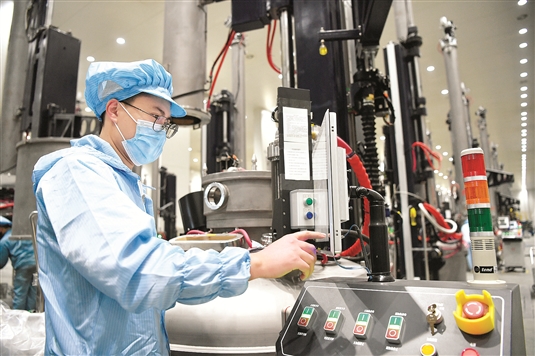Crystalline silicon industry

A technician monitors equipment in crystalline silicon production line developed by Baotou-based JA Solar [Photo/Baotou Daily]
In recent years, Qingshan district -- in Baotou, North China’s Inner Mongolia autonomous region -- has been developing its crystalline silicon manufacturing industry, with major projects settled in Baotou Equipment Manufacturing Industrial Park.
So far, a polycrystalline ingot plant developed by Canadian Solar (Baotou), with an investment of 4 billion yuan ($564 million yuan) and a 3 gigawatt crystalline silicon plant developed by Baotou-based JA Solar, with an investment of 3 billion yuan have settled there productively.
Elsewhere, a total of 431 sets of equipment have started operating in a 5 GW monocrystalline plant developed by Wuxi Shangji Numerical Control Co, with an investment of 3 billion yuan.
A quartz product production project being developed by Xinyu Qunhe Photovoltaic Technology Co is currently installing equipment installing and is expected start production before the end of May.
Officials said that by the end of 2020, the annual output value of the crystalline silicon manufacturing industry in the district is expected to reach 6 billion yuan.
A high-purity crystalline silicon project funded by Inner Mongolia Tongwei High-purity Crystalline Silicon Co was completed in Hondlon district in Baotou in 2018.
High-purity crystalline silicon is an important raw material for the photovoltaic or solar power industry and is mainly used to produce downstream products such as silicon wafers, cell sheets and components.
The Inner Mongolia Tongwei High-purity Crystalline Silicon Project was launched in October 2017 and the plant officially started operations after only 12 months -- much shorter than the usual 18 month construction period for domestic enterprises and the international 36-60-month construction time standard.
After the project went into production, more than 70 percent of the products can meet the needs of P-type single crystals and N-type single crystals, gradually replacing imported products.
Officials said this will further alleviate the need to rely on foreign imports for 40 percent of domestic high-purity crystalline silicon.
